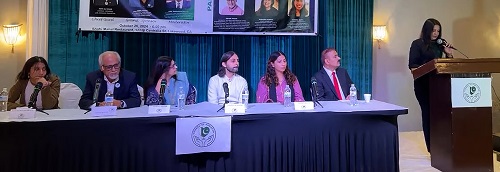Friends of Pakistan Hosts Panel on Media Representation and Identity
By Our Staff Reporter
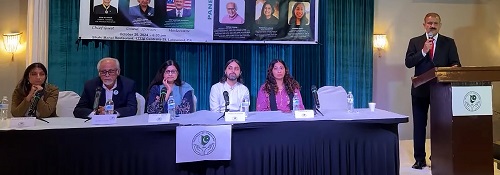
Amid a complex and evolving political landscape, the Friends of Pakistan recently hosted a thought-provoking panel discussion featuring prominent Pakistani and Indian American media professionals. The event explored themes of representation, identity, and the pivotal role of minority voices in American media.
The distinguished panel included esteemed professionals from The Los Angeles Times and NPR:
· Irfan Khan: Retired LA Times photojournalist
· Rubaina Azhar: Multiplatform editing lead on the LA Times morning copy desk
· Jaweed Kaleem: LA Times reporter covering K-12 and higher education
· Suhauna Hussain: LA. Times business reporter focused on California labor and workplace issues
· Ameera Butt: Audience engagement editor at National Public Radio
The event was expertly moderated by Arif Zaffar Mansuri, Chairman of Friends of Pakistan and Managing Director of the Pakistan Link and Urdu Link newspapers. 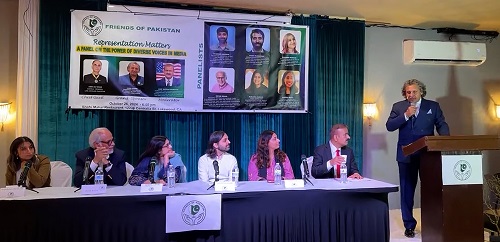
Welcoming Remarks and Inspiring Messages
Mansuri opened the evening by welcoming the chief guest, Asim Ali Khan, Consul General of Pakistan in Los Angeles. In his remarks, Khan emphasized the importance of the Pakistani diaspora actively engaging in media and other sectors to strengthen their representation in the United States.
Jamal Khawaja, President of Friends of Pakistan, set the tone with a powerful statement: “We are American. Our culture is American. Our home is America.”
Panelists Share Their Journeys
Each panelist shared their unique journey into journalism. For Azhar, Kaleem, Hussain, and Butt, the path began in high school and college publications, where they discovered the transformative power of storytelling. Their experiences in campus journalism provided a platform to amplify their voices, particularly in the post-9/11 era, when accurately representing Muslim and South Asian communities became more critical than ever.
Irfan Khan, the panel’s senior member, shared his inspiring journey, which began with mentorship opportunities in Pakistan and evolved into a fulfilling career in photojournalism in the US.
Challenges and Triumphs
The panelists spoke candidly about their experiences in the media industry, highlighting the support and camaraderie they found among their colleagues. Interestingly, the most significant challenges often came from their own communities, where careers in journalism were sometimes viewed as unconventional or unaccomplished.
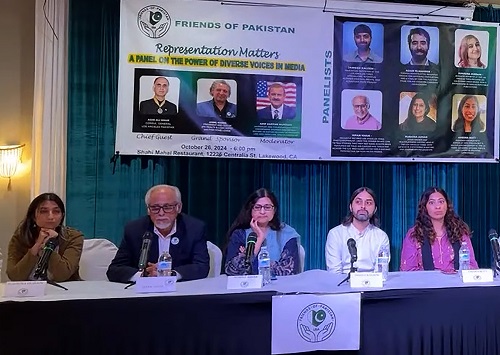
Despite these hurdles, the panelists remained deeply committed to their work. Azhar shared her efforts to ensure cultural and religious accuracy in her editing role at the LA Times. She recounted advocating for changes to the publication’s style guide, such as correcting the spelling of "Quran" and Arabic surnames, to better represent Muslim communities.
Kaleem and Butt discussed how initial assignments covering Ramadan opened doors to report on a broader range of cultural and religious events, fostering more inclusive coverage within their organizations. 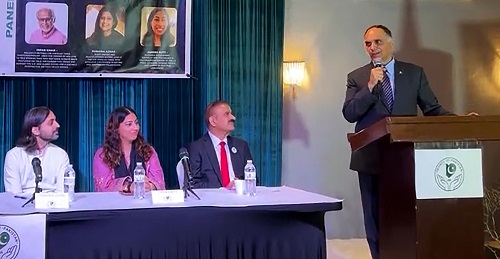
A Call to Action
The event concluded with a lively Q&A session. One audience member asked about media bias and how journalists ensure fair representation of Pakistanis and Muslims. In response, audience member Sarah Ahmad passionately emphasized the shared responsibility between communities and media professionals:
“The power to change [bias in media and politics] lies with individuals like you. You must ensure your stories are told accurately. Call, email, and message anyone and everyone. Your voices matter and carry weight. Make your voices heard.”
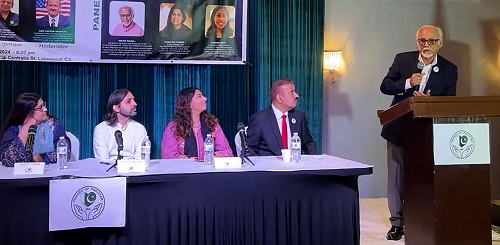
A Step Towards Authentic Representation
The engaging discussion underscored the ongoing efforts of South Asian Americans to contribute to authentic and nuanced representation in media. At a time when many minorities feel undervalued and underrepresented, the event highlighted the importance of dialogue and active participation in shaping the narratives that define their communities.
Friends of Pakistan continues to play a vital role in fostering these crucial conversations, empowering individuals to claim their rightful place at the table of representation.
